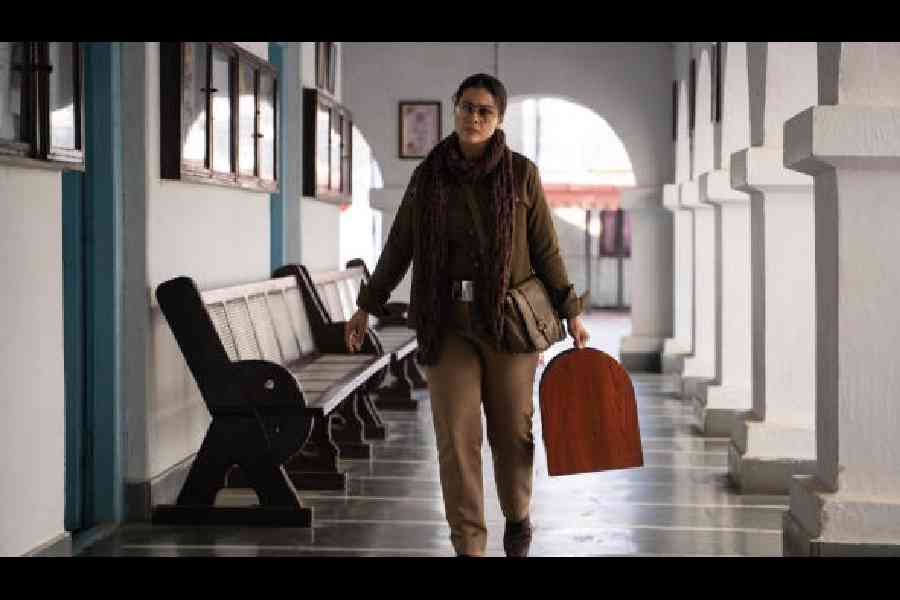The growing worry about lack of quality control in the OTT space now has a physical embodiment. Do Patti. A film which may have its heart in the right place but is otherwise all over the place. Do Patti aims to be a sensitive and scathing film on domestic abuse. The other tags it wants to earn for itself are a noir thriller, a police procedural, a film on sibling rivalry, a blistering criticism of privilege and a racy romance laced with sex, lies and videotape (or rather, mobile phone footage). It ends up being neither.
Do Patti, directed by Shashanka Chaturvedi, is a disjointed watch which tests your patience at almost every turn. Its amateurish treatment in terms of premise, plot, players and pacing makes a mockery of the pressing social issue it attempts to address.
Now playing on Netflix, Do Patti is written and co-produced by Kanika Dhillon. Kanika is also the writer of the Haseen Dillruba films on Netflix, a small-town noir thriller franchise which is uneven but still makes for compelling viewing because of its pulpy feel. In Do Patti, Kanika aspires to gift-wrap domestic violence in a package embellished with love, seduction, betrayal, mystery and even a couple of item/ party songs, one of which is titled Thaai, thaai! (which, the subtitles translate to ‘bang, bang!’) Once it goes down that rabbit hole, there is no rescuing Do Patti.
There is also a real rabbit in the film. One which newly-transferred cop Vidya Jyoti Kanwar (Kajol) carries around in a cage, even to the police station, post the demise of her mother who had kept the rabbit as a pet. That is not even close to the most bizarre thing about Do Patti. Vidya Jyoti — or VJ as she is popularly known in cop circles — talks like Kajol’s Anjali of Chandni Chowk in the first half of Kabhi Khushi Kabhie Gham. VJ’s see-sawing local accent — she says “Thank you” in the Queen’s English but pronounces ‘normal’ as ‘naarmaal’ — is as inconsistent as the rest of Do Patti.
One of VJ’s first cases involves an anonymous call about a woman who may have been roughed up by her husband. That happens to be Saumya (Kriti Sanon #1) whose simple and homely ways are in direct contrast to that of her sexy, outgoing twin sister Shailee (Kriti Sanon #2). Saumya is married to Dhruv (TV heartthrob Shaheer Shaikh makes his film debut), a Haryanvi stud with massive anger issues. Dhruv has a paragliding business, a rich father with political connections and the inability to choose between the sisters. Before marrying Saumya (“you feel like home”, he tells her), Shailee and Dhruv were an item. The two sisters have never seen eye to eye and when Dhruv ditches one for the other, we are subjected to cringe dialogues like “ek chimta do rotiyaan” and “tujh jaise ko toh paanch peg mein bhula doon, lekin ab lagta hain poora bar khaali karna padega”.
For a film which has big names attached to it — Do Patti marks Kriti’s debut as producer — the production values are surprisingly below average. The paragliding close-ups are a VFX fail. Most of the supporting performances are also below par, like that of the otherwise reliable Tanvi Azmi who is left hamming in a role which does her acting abilities no justice.
Do Patti primarily focuses on Kriti. The actress, who has grown with every part, does her best in bringing newness and nuance to both her roles, but in the event of the lack of a credible script and the shoddy treatment of whatever little the film seems to offer, Kriti is unable to leave a mark. To give her her due, Do Patti may have seemed like a potent idea on paper and we get why Kriti may have wanted to put money, mind and muscle behind it. Shaheer Shaikh is a competent actor and gets ample screen time in a role which has more than fifty shades of grey. Kajol is the one who the viewer will feel shortchanged by. Not only is her part sketchily written, Kajol, to be honest, seems to be sleepwalking through the film.
Do Patti, in the end, is a case of what could have been. There is an interesting idea tucked in there and perhaps enough honest intent to make a film that enlightens, entertains and impacts. A powerful scene between two key players, riddled with violence both physical and emotional which will leave you shaken and scarred, is a reminder that this film could have been so much more. And, of course, so much better.











